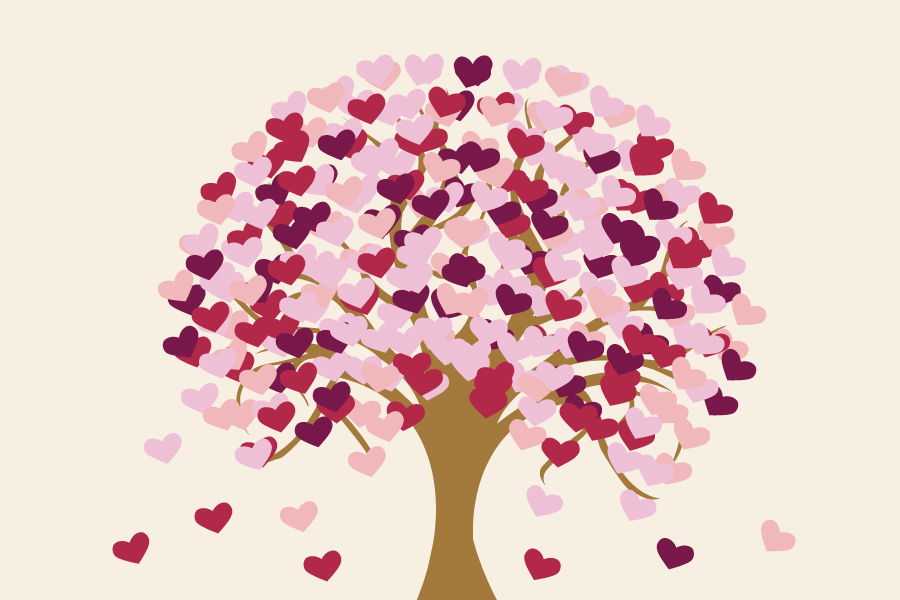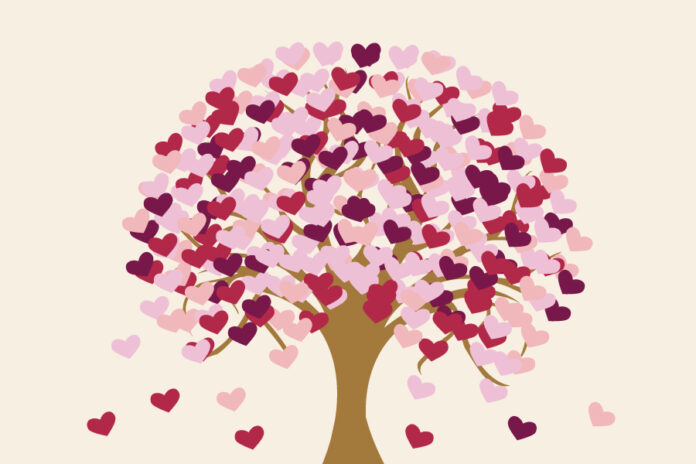
One of life’s universal feelings is surprisingly tricky to define
 I’m no expert on love. Only one person has ever received the love of this guy, your columnist. Yeah, just one. But taking that love-mobile for a spin revealed something intriguing. I began wondering about the word “love” and all its puzzling connotations. And that’s not an easy thing to solve.
I’m no expert on love. Only one person has ever received the love of this guy, your columnist. Yeah, just one. But taking that love-mobile for a spin revealed something intriguing. I began wondering about the word “love” and all its puzzling connotations. And that’s not an easy thing to solve.
Everyone will experience that crazy, stupid little thing called love at some point (unless you’re James Franco; that guy is incapable of loving). Love is one of life’s concepts that’s pretty much universal, like death and taxes. It’s also nearly impossible to express through language. If there was one word tossed around the most but understood the least, it’s “love.”
Attempting to define love is like training for a hot dog-eating contest. It’s both frustrating and nauseating, and it leaves you feeling slightly bloated.
Some definitions hit the mark better than others. Over at dictionary.com, love is defined as “a profoundly tender, passionate affection for another person.” But this would be inadequate for the ancient Greeks, who split love into four different categories — distinguishing between romantic or sexual desire and the love between friends and family, for example.
Writers and romantics have been trying to nail down the essence of love for millennia, from Homer to E. L. James. A catchall definition of love is tricky to pinpoint, but perhaps it doesn’t matter in the long run what love means. What seems to matter most is how love feels.
Not all feelings are created equally, of course. That crazy, stupid thing called heartbreak is certainly real — just ask your favorite singers. It’s also an inevitable part of our collective romantic journey. Over 85 percent of unmarried couples will break up, and even half of all married couples will end up cutting the knot eventually.
The people we love — a spouse, a sweetheart, a Tinder bondage buddy — are at the mercy of probability. What’s the point if realism dictates it might end?
There is a point, though. Love requires sacrifice, a lot of effort and a state of vulnerability that molds our character — and who doesn’t need a bit of character molding these days? In a life full of tidal waves, ups and downs and side-to-sides, love can be the cage that keeps the sharks away.
Okay, that concludes my semi-poetic rejoinder to love’s appeal. The point is that love is raw. It harkens back to a primitive state of being, a most basic form of connection to another person. And it’s those raw emotions that make us live irrationally sometimes, yes, but with a heightened sense of fulfillment that is tough to replicate.
True, it will most likely end. But so what? Those memories of the past will sting, at first, and then slowly dissipate as the months pass. Those tears will dry, and the heart will grow stronger and more knowledgeable of the things that make us happy. It takes time, as friends and experts will tell us, but eventually we emerge with renewed vitality. Besides, the line of attractive suitors is surely awaiting.
Imagine the multi-headed Hydra, a ferocious monster from Greek mythology. Every time it loses a head, new ones take its place. Love is this monster, and broken hearts feel like one of its lost heads. But in time, wounds heal, giving us much-needed strength after a period of doom and gloom.
If you know the myth, some guy named Hercules kills the Hydra. Well hey, maybe love doesn’t belong in this metaphor after all. Maybe love’s meaning is better left to the abyss, content to leave people struggling with their bloat as I have. Yeah, this love thing kind of sucks.
It’s all Greek to me.
Written by: Nick Irvin — ntirvin@ucdavis.edu
Disclaimer: The views and opinions expressed by individual columnists belong to the columnists alone and do not necessarily indicate the views and opinions held by The California Aggie.











